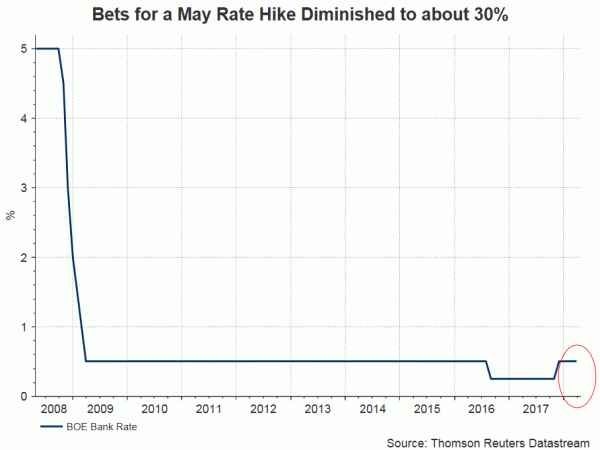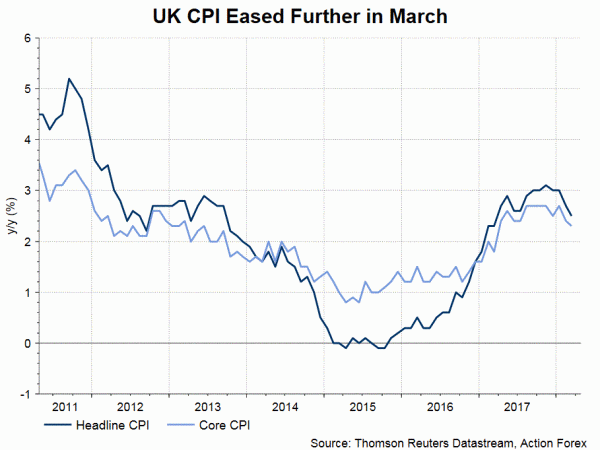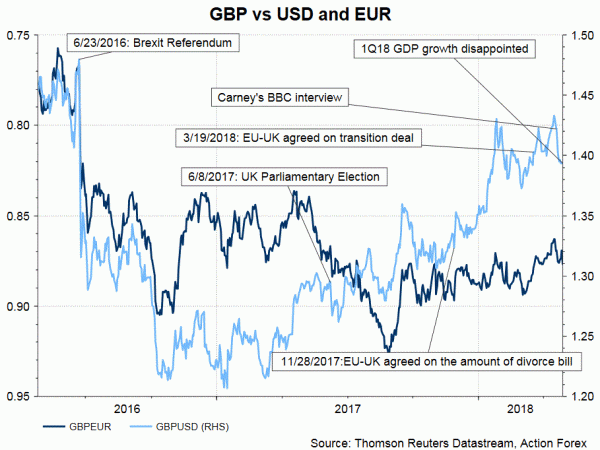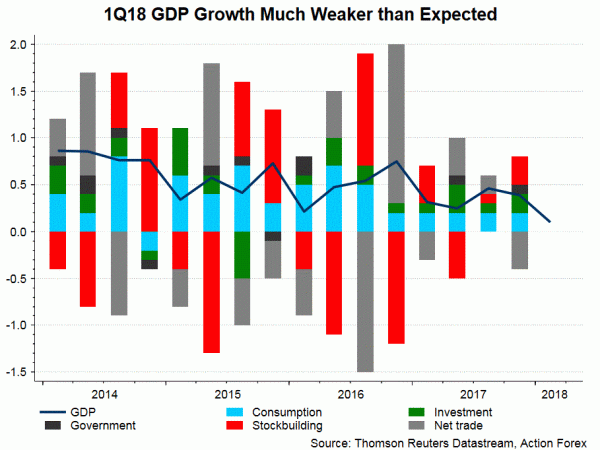British pound remains under pressure after Friday’s selloff. GBPUSD slumped almost -1% on Friday, resulting in a second consecutive weekly decline of the pair, as weakness in first quarter GDP growth was accompanied with BOE Governor Mark Carney’s dovish BBC interview in the prior week. The double disappointment also led to a +1% jump in EURGBP. Market pricing of a 25-bps rate hike slipped to 50% after Carney’s interview, down from 80% prior. The bet was further trimmed to about 30% after the GDP growth data. While we do not view the 1Q18 GDP growth data as a factor altering BOE’s rate hike decision, Brexit is a major determinant of BOE’s monetary policy path.
The preliminary data revealed that GDP expanded a mediocre +0.1% q/q in 1Q18, missing expectations of +0.3% and +0.4% in 4Q17. This also marks the weakest growth in 5 years. The biggest contributor of the disappointment was the -3.3% contraction in the construction sector. Elsewhere, production increased +0.7%, with manufacturing growth slowing to +0.2%. The slowdown in manufacturing activities was partially offset by an increase in energy production as a result of below-average temperatures. The services sector, gaining +0.3%, helped rescue the growth somewhat. However, the longer-term trend continues to show a weakening in services growth. While the Office for National Statistics acknowledged the adverse impacts of the snow in late February and early March on construction and retail sales, it noted that “the effects were generally small, with very little impact observed in other areas of the economy”.
Carney’s Dovish Shift
Talking to BBC, Carney affirmed a rate hike is “likely” this year, but emphasized that any increase would be “gradual”. He noted that the biggest uncertainty remains Brexit negotiations, including the details of the implementation period and the shape of a final deal. Policymakers would have to “adjust to the impact of those decisions in order to keep the economy on a stable path”. The Governor attempted to downplay the chance of a May rate hike. As he noted, “I am sure there will be some differences of view but it is a view we will take in early May, conscious that there are other meetings over the course of this year”. He suggested that there was a lot of data to consider before the decision in May, adding that “we have had some mixed data… On the softer side some of the business surveys have come off. Retail sales have been a bit softer – we are all aware of the squeeze that is going on in the high street”. The comments appeared more dovish than previous ones. Back in February, the BOE hinted at earlier and larger rate increases with the meeting minutes indicating that “monetary policy would need to be tightened somewhat earlier and by a somewhat greater extent over the forecast period than anticipated at the time of the November report”.
Ongoing Brexit Uncertainty
Despite the EU-UK transition deal reached in March, great uncertainty of the Brexit negotiation remains. Last week, the Parliament approved a non-binding motion requesting the UK to stay in the customs union after Brexit. This followed the 348-225 vote in the House of Lords to amend the Brexit legislation to negotiate a customs union on April 18. The upcoming local elections on May 3 might not affect the government’s Brexit strategy. However, there is high risk that the event would cause volatility in sterling’s movement. The upcoming elections cover all 32 London boroughs, 34 metropolitan boroughs, 67 district and borough councils and 17 unitary authorities. There will also be direct elections for the Mayoralties of Hackney, Lewisham, Newham, Tower Hamlets and Watford. The latest YouGov poll indicates the opposition Labor party is on course for the best performance in London local elections of any party for more than 40 years. After the elections, the focus would then turn to the June EU Summit, at which Northern Ireland border and future trade relations are still the most contentious issues.
In our opinion, the 1Q18 GDP growth data should not be a factor altering BOE’s rate hike decision, if policymakers hold the same judgment as the government – extreme weather – a temporary factor, was the key reason dragging down economic growth in the first quarter. More data are needed to confirm UK’s economic outlook, whether it remains on track or has begun slowing down. Brexit is indeed a major determinant of BOE’s monetary policy path.




